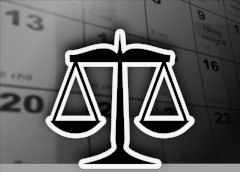New Penal Code a Setback for Freedom of Expression Issues
Published on 9 December 2010In summer 2010, UN High Commissioner for Human Rights Navi Pillay provoked strong condemnation from the Cambodian government when she criticized the judiciary's handling of cases involving opposition politicians Mu Sochua and Sam Rainsy.
As of Dec. 10, 2010, the same criticism could make her a criminal in Cambodia.
Under Article 523 of the Penal Code, which comes into effect tomorrow, any person who criticizes a "judicial act or decision" aiming to "endanger Cambodian institutions" can be sentenced to up to six months imprisonment and 1 million riel fine.
The provision is one among several problematic provisions highlighted by LICADHO in a brief analysis of new penal code sections which may potentially affect freedom of expression in Cambodia. The analysis is being released to mark the official enactment of the code, which coincidentally falls on International Human Rights Day.
LICADHO identified nine new penal code provisions which may pose a serious threat to Cambodians' expressive rights in the future. The penal code was enacted in 2009, but the substantive portions of the new penal code do not come into effect until Dec. 10, 2010.
"Cambodia already took a big step backwards on freedom of expression issues since 2008 said Pilorge Naly, Director of LICADHO. "Unfortunately, with the new penal code taking effect on Dec. 10, we may see two or three steps backward for 2011."
Attached to this press release are two documents: The first details provisions from the former UNTAC Code (click here to download) which were frequently abused to suppress expressive freedoms. The second analyzes sections of the new Penal Code (click here to download) which may be used to suppress expressive freedoms in the future.
Among the most concerning laws in the new code, all of which carry prison terms:
* Incitement (Article 495): The crime is defined as incitement to commit a crime or incitement of "serious turmoil in society." This vague phrasing makes Article 495 similar to the former disinformation provision, which criminalized certain "malicious" disturbances of "the public peace" (UNTAC Code Article 62).
* Contempt (Article 502): Criminalizes any act, gesture, writing, etc., directed at a public official that affects the "dignity of a person." The elements are vague and highly subjective; taken to the extreme the article could criminalize all acts which hurt the feelings of public officials.
* Publication of Comments Intended to Influence a Court (Article 522): The provision could effectively criminalize public advocacy by NGOs and others, who frequently make statements regarding pending trials. See also Article 523, which prohibits criticism of a
judicial act or decision after the fact. These articles would also almost certainly outlaw advocacy campaigns such as the one led to the release of scapegoats Born Samnang and Sok Sam Oeun, who were falsely convicted of murdering unionist leader Chea Vichea.
"The scope of these provisions is breathtaking," said Dr. Pung Chhiv Kek, President of LICADHO. "Articles 522 and 523, for example, could potentially criminalize any criticism of the judiciary."
The code also carries certain supplementary punishments which may pose a particular threat to expressive freedoms:
* Most criminal fines are now mandatory, and failure to pay the fine nearly always results in a prison term of up to two years. Thus an individual found guilty of defamation - which carries a mandatory fine but no prison term - may end up in prison anyway.
* Most provisions carry an array of supplementary punishments, which include provisions open to serious abuse, including:
- Expulsion from a profession, which may be used to purge teachers, lawyers, journalists, etc., who express dissenting political opinions in the course of their work.
- Suspension of unspecified "civic rights," possibly including voting, public speech, movement, etc.
- Confiscation of property that may have aided certain crimes, including crimes involving speech; could be used to confiscate computers, printing presses and material required to operate NGOs, news outlets and other organizations.
LICADHO's brief analysis on specific provisions of the penal code will also be included in LICADHO's upcoming report "Freedom of Expression in Cambodia: The Illusion of Democracy," which is scheduled to be released later in December.
For more information, please contact:
▪ Naly Pilorge, LICADHO Director, 012 803 650
▪ Ham Sunrith, LICADHO Deputy Director of Monitoring & Protection, 012 988 959
PDF: Download full statement in English - Download full statement in Khmer






